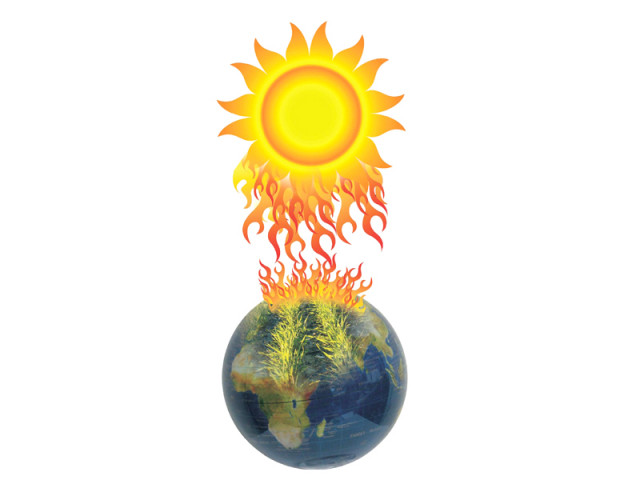Coping with climate change: Pakistanis taking individual actions, new study reveals
Suggests communication to encourage effective response.

Environment journalist Rina Saeed Khan said print and electronic media in Pakistan have started to pay more attention to climate change since the devastating 2010 floods. PHOTO: FILE
Pakistanis are second only to the Chinese among seven Asian countries that have taken ample action at community and individual levels to respond to climate change, according to a new comprehensive study on climate change perceptions and responses in Asia.
In Pakistan’s case, according to the study, these community and individual efforts to combat climate threats are taking place despite lack of government support, low levels of confidence in government interventions, and lack of information on climate change.
Around two-thirds of Pakistani respondents for BBC Media Action’s “Climate Asia” report indicated they have made some changes in livelihood or lifestyle that could be directly attributed to climate-related issues.
But some 72 per cent of those same respondents said they were not confident that the government was taking necessary actions to respond to climate change, according to the report.
The Pakistan section of the report was launched at a local hotel on Wednesday during a ceremony organised by Oxfam Pakistan.
The Climate Asia report is based on 33,500 surveys, 100 focus groups and 115 in-person interviews conducted between March 2012 and January 2013 in Pakistan, India, Bangladesh, China, Nepal, Indonesia and Vietnam, said Khadija Zaheer, a researcher and projects officer at BBC Media Action. In a way, the most important aspect of the report was its emphasis on communication and media as tools for building awareness, supporting discussions in communities, and improving institutional support, all in an attempt to “help people respond to climate change.”
Zaheer said the report’s findings show that Pakistanis are responding at individual and community-level. She said despite low confidence in governments, Pakistani respondents seemed to have faith in local institutions such as neighbourhood committees and community-based networks.
A whopping 50 per cent of respondents said they were not familiar with the term “climate change.”
But 72 per cent said they had felt an increase in temperature and 51 per cent perceived a decline in rainfall --- indications that changes in climate were being noticed, which global climate watchdogs consider one of the country’s most vulnerable to extreme weather events.
The survey results showed that Pakistanis vary in their responses to climate change. Which, in turn, means they need to be reached out to in different ways with different sets of information on climate change, Zaheer said.
In order to identify the opportunities of communicating with the public, Zaheer said the report segmented its respondents into five categories based on their responses to climate change. While 41 per cent believed there was no need to act, 26 per cent were “acting and wanting to do more,” 17 per cent were finding it too hard to take action, 10 per cent were willing to act, and seven per cent said they were trying to act but finding it very difficult.
The report suggested different communication strategies for each group, where people already adapting to climate change can be provided with more technical information, and people who are indifferent to climate issues can be communicated with, focusing on the negative impact of climate change.
The report also suggests that the content of communication messages should reach out to women, farmers and youth as “priority audiences” which are willing to take actions to cope with climate change but are not sure how to do it.
Environment journalist Rina Saeed Khan, who spoke at the report launch, said print and electronic media in Pakistan have started to pay more attention to climate change since the devastating 2010 floods.
She stressed the need for more reporting on climate change and environmental issues in Urdu and regional languages because news items in these languages can have a bigger impact on the general public than English-language environment journalism.
Oxfam Pakistan Country Director Arif Jabbar Khan said climate change, especially the variability and unpredictability in rainfall, was making institutional knowledge of cropping patterns amassed by small farmers over generations irrelevant.
He said the resulting “knowledge gap” among the farmer community should be filled through awareness-raising campaigns and provision of information on changing weather patterns.
Published in The Express Tribune, March 13th, 2014.


















COMMENTS
Comments are moderated and generally will be posted if they are on-topic and not abusive.
For more information, please see our Comments FAQ